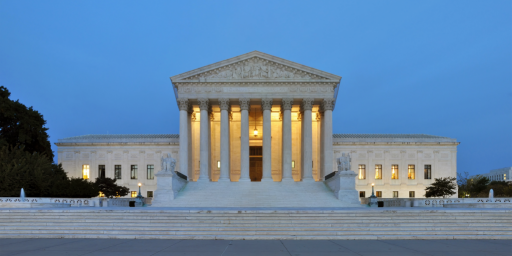Licensing Barbers
Why do we need to license barbers, again?
Matt Yglesias figures that, since he’s able to cut his own hair, it’s silly to license barbers.
His commenters point out to him, fairly rudely, that people who handle straight razors probably ought to have some training and prospect of inspection from the authorities for health reasons. And that beauticians, who handle dyes and other chemicals, really need to be regulated. Apparently, they’ve explained this to him once or twice before, and hence their irritation.
Mostly, I think the commenters are right. While the free market would probably regulate simple barber shops — as opposed to beauty shops — with reasonable efficiency, we’d hate to have barbers routinely cutting people with infected implements. Let’s just say that the signaling mechanisms for that sort of thing are too slow for comfort.
Further, in terms of arguing by analogy, if Matt is an unlicensed barber, I’m an unlicensed taxi driver and restaurateur. The idea that because people can be trusted to do something for themselves, they should therefore be allowed to do the same things for the public on a professional basis is rather thin.






The problem is that these licensing regulations usually end up being nothing more than methods by which existing businesses are able to create barriers to entry for competitors.
The Institute for Justice has done some great work on this issue over the years, and they’ve represented people who were faced with liscening requirements for
Interior designers – http://www.ij.org/economicliberty/1239
Computer repair — http://www.ij.org/economicliberty/2188
Hair braiding — http://www.ij.org/economicliberty/2211
and, Animal Massage — http://www.ij.org/economicliberty/2203
If the licensing were neutral it might be another story — although I don’t see any logical reason why interior designers, for example, should be regulated by the state — but that’s not how it typically turns out.
Regulation often gets subject to regulatory capture, to be sure. But that’s not a reason to end regulation altogether.
I can’t offhand conjure a reason interior designers ought be regulated.
My state used to license tree cutters, but did away with the licensing program in favor of a simple requirement to have insurance. That seems to a better approach in general.
The reason interior designers are licensed is to build confidence in the profession, or more accurately confidence that there is such a profession and that it is therefore worth more money.
I like the term you used: signaling mechanisms. I am casually interested in the free-market vs regulatory body debate and hadn’t see a term for the concept of how information is transmitted within a free market about service/products satisfaction and performance and how that information is transmitted to potential customers so that they can make an informed decision. The trouble I have with free-market-only zealots is the lack of dealing with the transition to a free market from a regulated market (uneven starting lines, for one example, prohibits new entries into the field), as well as how deep the free market goes (patents? copyrights? insider trading? collusion? false advertising?).
Since the signaling mechanisms need to be there for consumers to make choices, and none of us live a life so free as to spend enough time researching all of the possible data to support a decision point every single time we make a decision, then we rely on regulation to support us in providing some confidence in the basics so we can focus on the details that concern us on a personal/immediate basis. Removing all/significant amounts of regulation with out those signaling mechanisms prevents decisions from being made, or at least with confidence, and I think that if I knew that buying this medical treatment/car/house/clothes without any confidence in the safety, efficacy, impact, or performance except what I can provide to myself through my own research, then I am less likely to make that purchase or investment. The economy would slow down to a screeching halt…at least to my layman’s logic.
I don’t think there is a one-size-fits-all solution to keep the regulatory side (to protect consumers) perfectly balanced with need, however they might be determined.
I cant’ recall any commentator saying that a currently regulated industry should be entirely deregulated of all oversight by the government. Maybe I missed something.
So the question is: how to balance regulation with business freedom to grow and/or fail? And who determines what that balance is?
There are options:
Completely segregate regulatory bodies from industry. But that interferes with freedom of speech, some say.
Have the businesses themselves “self-regulate”, but that opens up monopoly rule and insider preferential treatment…
Any others that mix in the middle?
And I don’t think interior designers are regulated, at least not as designers. There business regulations about running a business, yes, but not in particular about interior design itself, unless they are acting as structural engineers, or other aspects regarding construction or remodeling infrastructure.
I don’t have a problem with licensing barbers per se, but the problem I do see is that you end up with situations like in New Jersey where (as I understand it) you have to be certified in all manner of hair care just to cut hair. If someone wants to be a barber instead of a hairstylist, I don’t think that they should have to certify to do the latter. My grandfather was a barber and not a hairstylist and so this is a subject that hits kind of close to home. If the market no longer supports people like my grandfather, that’s cool. But there seems to be a market for it around where I live.
I’m with Yglesias on this. Hair cutting is one of those things that relies on word of mouth (for barbers and stylists) or brand recognition (in the case of chains). There’s plenty of incentive to know what you’re doing in the industry. If dangerous chemicals are a concern, have an inspector come around every once in awhile to make sure they’re properly disposed of.
Even the most hardcore Ancap like myself doesn’t have a problem with voluntary licensing. Businesses frequently go out of their way to obtain optional (but valuable) independent certifications. Kosher food certifications come to mind. Good Housekeeping seals. ANSI standards. ISO9000 and the like. Why a system like this would cause hairstylists, restaurants, and taxis to become dangerous, I don’t know.
The licensed barbers and stylists would put their seals of approval right up there in their windows. And you could choose to enter or not. Some form of regulatory capture could still occur with private certification agencies, but at least in that case a competing agency could enter the market, which would give more options than the current situation.